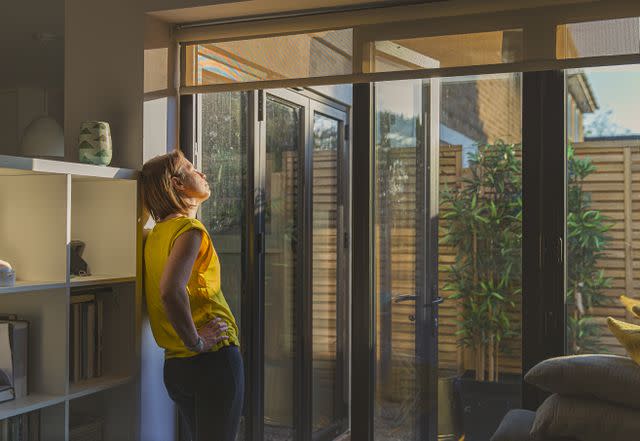Do You Still Need to Isolate If You Have COVID?
The COVID-19 public health emergency may be over, but certain protocols still remain.

Getty Images / Justin Paget
Fact checked by Nick Blackmer
As of May 11, the United States government and the World Health Organization have declared that COVID-19 is no longer considered a public health emergency.
Even though the public health emergency has ended, experts say people should still isolate for at least 5 days if they test positive for COVID-19.
People who test positive for the virus should continue to follow other health protocols like wearing a mask and notifying close contacts.
COVID-19 is not the same focal point it was three years ago, but there are still certain precautions and practices in place to keep the general public safe.
Recently, both the United States government and the World Health Organization have declared that the COVID-19 pandemic is no longer a public health emergency.
Despite hitting this major milestone, experts say it does not mean that COVID-19 is no longer of concern. Additionally, they caution against disregarding the health protocols that many people diligently followed throughout the pandemic.
“While the federal Public Health Emergency declaration has ended, COVID-19 has not,” Kate Grusich, CDC spokesperson, told Health in an email. “COVID-19 remains an ongoing public health threat that we have to address alongside other infectious diseases.”
It’s also important to keep in mind although COVID-19 hospitalization and deaths are on consistently downward trends, there are county-based hotspots that are still occurring, Mark Cameron, PhD, associate professor in the Department of Population and Quantitative Health Sciences, School of Medicine at Case Western Reserve University, told Health.
In addition, COVID-19 is still causing nearly ten thousand hospitalizations a week, with the majority of U.S. states reporting hundreds of provisional COVID-19 deaths over the last three months, Cameron noted.
Given the ongoing risks associated with the virus, it remains crucial for people to adhere to proper health protocols, especially if they test positive for COVID-19 or experience any symptoms related to the virus.
“Despite the bureaucratic end of the COVID-19 emergency, along with more readily available public health support and tracking data and often, workplace accommodation of isolation, we should still be testing and isolating,” Cameron continued.
Grusich added that because some people can still get very sick from COVID-19, following proper health protocols like isolating can help protect you and others from the potential transmission and serious disease.

Getty Images / Justin Paget
Related:What the End of the COVID-19 Public Health Emergency Means for Testing and Treatment Costs
How Long Do I Need To Isolate For If I Test Positive?
If you test positive for COVID-19 or suspect that you have it, you should follow the CDC’s guidelines for isolation, regardless of your symptoms and vaccination status, Grusich said. The current recommendation is to isolate yourself from others in your household for at least 5 days.
“You are likely most infectious during the first 5 days,” Grusich explained. By isolating during this time, you can help prevent further spread of the virus to others.
Isolation Timeline, Symptoms, and Vaccination Status
If you are experiencing any symptoms related to COVID-19, such as shortness of breath, new loss of taste or smell, cough, or fatigue, you should still isolate for 5 days, Stuart Ray, MD, infectious disease specialist and a professor of medicine at Johns Hopkins University School of Medicine, told Health.
However, if your symptoms improve or go away, you may end isolation after day 5, but that’s only if you are fever-free for 24 hours, without the use of fever-reducing medications.
If you do not have any symptoms but test positive on a COVID-19 test, you may end isolation after day 5, said Grusich. If you had moderate illness, like shortness of breath or difficulty breathing, she recommends isolating for 10 days.
Grusich added those with severe illness (hospitalized or weakened immune system), should consult with their healthcare provider before ending isolation.
Despite any vaccinations you may have received for COVID-19, you should continue to follow the recommendations from the CDC, including isolation for 5 days or longer depending on your symptoms.
“Vaccination remains the safest way to gain immunity to this virus, but many people have been infected one or more times,” Ray said. “Because people have gained some degree of immunity in various ways at this point, vaccination status is not a major consideration when deciding on isolation times.”
If you still have questions regarding whether or not you need to isolate or how long you should isolate, reach out to a healthcare provider or consult online tools.
“I wouldn’t call the CDC’s guidance simple, because it allows for various checkpoints and is therefore flexible to one’s course of illness,” Cameron explained. “But it boils down to if you’re feeling fine, you’re free after five days of isolation that is, but note the isolation can extend to 10 days if more moderate or severe symptoms persist.”
Additional COVID-19 Protocols to Follow
Beyond isolating at home, if you test positive or suspect that you have COVID-19, experts recommend following these standard health protocols:
Notify close contacts when you become aware of a new infection
Inform any healthcare professionals involved in your care, including caregivers or nurses about infection to ensure you are receiving care appropriate to your risk
Wear a high-quality and well-fitted mask for at least 5 days after isolation if you are around others at home or in public places
Do not go to places where you are unable to wear a mask
Avoid travel
Stay home and separate from others as much as possible
Use a separate bathroom from others, if possible
Try to take steps to improve ventilation in your home
Don’t share any personal household items, like cups, towels, and utensils with others
If you have an emergency warning sign (like trouble breathing), seek emergency medical care immediately
Related:The 7 Best At-Home COVID-19 Tests of 2023, Tested and Reviewed
For more Health news, make sure to sign up for our newsletter!
Read the original article on Health.

